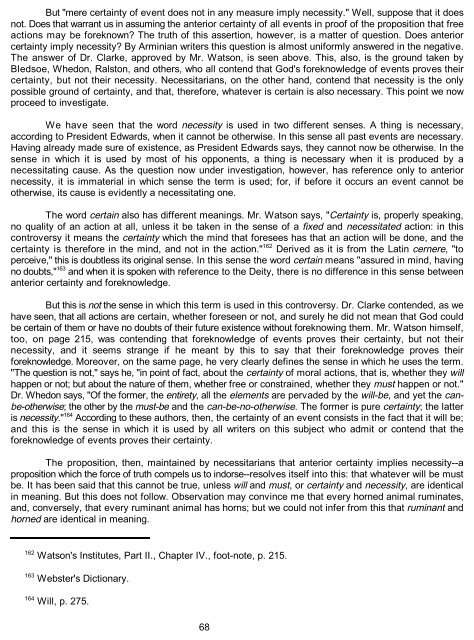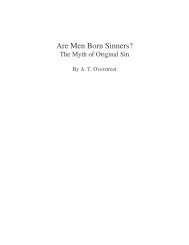Foreknowledge by Joel Hayes - Library of Theology
Foreknowledge by Joel Hayes - Library of Theology
Foreknowledge by Joel Hayes - Library of Theology
Create successful ePaper yourself
Turn your PDF publications into a flip-book with our unique Google optimized e-Paper software.
But "mere certainty <strong>of</strong> event does not in any measure imply necessity." Well, suppose that it does<br />
not. Does that warrant us in assuming the anterior certainty <strong>of</strong> all events in pro<strong>of</strong> <strong>of</strong> the proposition that free<br />
actions may be foreknown? The truth <strong>of</strong> this assertion, however, is a matter <strong>of</strong> question. Does anterior<br />
certainty imply necessity? By Arminian writers this question is almost uniformly answered in the negative.<br />
The answer <strong>of</strong> Dr. Clarke, approved <strong>by</strong> Mr. Watson, is seen above. This, also, is the ground taken <strong>by</strong><br />
Bledsoe, Whedon, Ralston, and others, who all contend that God's foreknowledge <strong>of</strong> events proves their<br />
certainty, but not their necessity. Necessitarians, on the other hand, contend that necessity is the only<br />
possible ground <strong>of</strong> certainty, and that, therefore, whatever is certain is also necessary. This point we now<br />
proceed to investigate.<br />
We have seen that the word necessity is used in two different senses. A thing is necessary,<br />
according to President Edwards, when it cannot be otherwise. In this sense all past events are necessary.<br />
Having already made sure <strong>of</strong> existence, as President Edwards says, they cannot now be otherwise. In the<br />
sense in which it is used <strong>by</strong> most <strong>of</strong> his opponents, a thing is necessary when it is produced <strong>by</strong> a<br />
necessitating cause. As the question now under investigation, however, has reference only to anterior<br />
necessity, it is immaterial in which sense the term is used; for, if before it occurs an event cannot be<br />
otherwise, its cause is evidently a necessitating one.<br />
The word certain also has different meanings. Mr. Watson says, "Certainty is, properly speaking,<br />
no quality <strong>of</strong> an action at all, unless it be taken in the sense <strong>of</strong> a fixed and necessitated action: in this<br />
controversy it means the certainty which the mind that foresees has that an action will be done, and the<br />
162<br />
certainty is therefore in the mind, and not in the action." Derived as it is from the Latin cernere, "to<br />
perceive," this is doubtless its original sense. In this sense the word certain means "assured in mind, having<br />
163<br />
no doubts," and when it is spoken with reference to the Deity, there is no difference in this sense between<br />
anterior certainty and foreknowledge.<br />
But this is not the sense in which this term is used in this controversy. Dr. Clarke contended, as we<br />
have seen, that all actions are certain, whether foreseen or not, and surely he did not mean that God could<br />
be certain <strong>of</strong> them or have no doubts <strong>of</strong> their future existence without foreknowing them. Mr. Watson himself,<br />
too, on page 215, was contending that foreknowledge <strong>of</strong> events proves their certainty, but not their<br />
necessity, and it seems strange if he meant <strong>by</strong> this to say that their foreknowledge proves their<br />
foreknowledge. Moreover, on the same page, he very clearly defines the sense in which he uses the term.<br />
"The question is not," says he, "in point <strong>of</strong> fact, about the certainty <strong>of</strong> moral actions, that is, whether they will<br />
happen or not; but about the nature <strong>of</strong> them, whether free or constrained, whether they must happen or not."<br />
Dr. Whedon says, "Of the former, the entirety, all the elements are pervaded <strong>by</strong> the will-be, and yet the canbe-otherwise;<br />
the other <strong>by</strong> the must-be and the can-be-no-otherwise. The former is pure certainty; the latter<br />
164<br />
is necessity." According to these authors, then, the certainty <strong>of</strong> an event consists in the fact that it will be;<br />
and this is the sense in which it is used <strong>by</strong> all writers on this subject who admit or contend that the<br />
foreknowledge <strong>of</strong> events proves their certainty.<br />
The proposition, then, maintained <strong>by</strong> necessitarians that anterior certainty implies necessity--a<br />
proposition which the force <strong>of</strong> truth compels us to indorse--resolves itself into this: that whatever will be must<br />
be. It has been said that this cannot be true, unless will and must, or certainty and necessity, are identical<br />
in meaning. But this does not follow. Observation may convince me that every horned animal ruminates,<br />
and, conversely, that every ruminant animal has horns; but we could not infer from this that ruminant and<br />
horned are identical in meaning.<br />
162<br />
Watson's Institutes, Part II., Chapter IV., foot-note, p. 215.<br />
163<br />
164<br />
Webster's Dictionary.<br />
Will, p. 275.<br />
68






